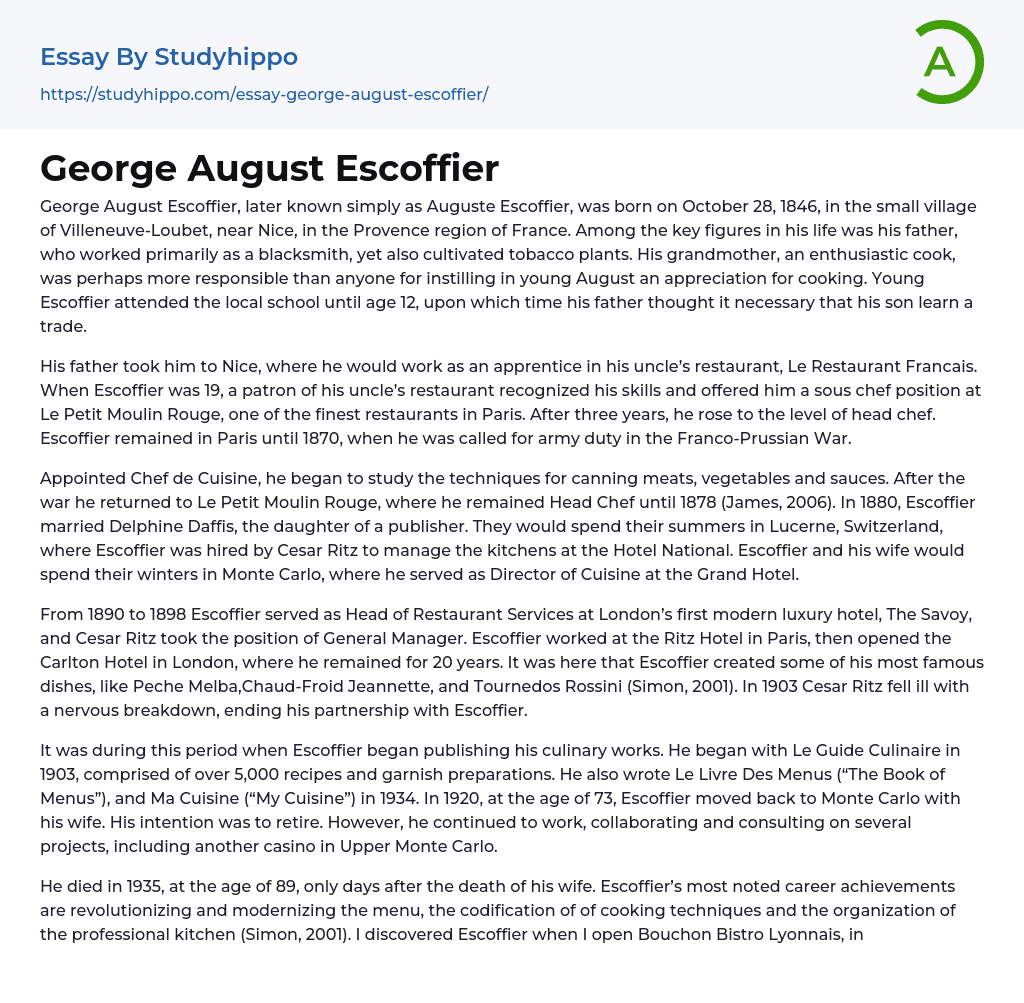George August Escoffier, later known as Auguste Escoffier, was born on October 28, 1846, in the small village of Villeneuve-Loubet, near Nice, in the Provence region of France. His father worked as a blacksmith and cultivated tobacco plants. However, it was his grandmother who greatly influenced Escoffier's love for cooking through her avid skills in the kitchen. Until he turned 12 years old, Escoffier attended the local school but then his father believed it was time for him to acquire a trade.
His father took him to Nice where he began his career as an apprentice at Le Restaurant Francais, which was owned by his uncle. At the age of 19, a customer who dined at his uncle's establishment recognized Escoffier's skills and offered him a position as a sous chef at Le Petit Moulin Rouge, one of Paris' top restaurants. W
...ithin only three years, he advanced to the role of head chef. Escoffier remained in Paris until 1870 when he was called upon to serve in the military during the Franco-Prussian War.
After acquiring knowledge on preserving meats, vegetables, and sauces as Chef de Cuisine, he later became the Head Chef at Le Petit Moulin Rouge until 1878 (James, 2006). In 1880, he married Delphine Daffis who was the daughter of a publisher. During his summer stays in Lucerne, Switzerland, he worked alongside Cesar Ritz at Hotel National. Furthermore, during winters spent in Monte Carlo, he assumed the role of Director of Cuisine at the Grand Hotel.
From 1890 to 1898, Escoffier was the Head of Restaurant Services at The Savoy, London's first modern luxury hotel. Cesar Ritz served as the General Manager during this period. Afterward,
Escoffier moved to the Ritz Hotel in Paris and later opened the Carlton Hotel in London, where he remained for twenty years. It was during his tenure at the Carlton Hotel that Escoffier created some of his most renowned dishes such as Peche Melba, Chaud-Froid Jeannette, and Tournedos Rossini (Simon, 2001). In 1903, Cesar Ritz's nervous breakdown resulted in the dissolution of their partnership.
During this period, Escoffier started publishing his culinary works. In 1903, he released his first publication called Le Guide Culinaire. This book included over 5,000 recipes and garnish preparations. In addition to that, Escoffier authored Le Livre Des Menus and Ma Cuisine in 1934. At the age of 73 in 1920, Escoffier returned to Monte Carlo with his wife intending to retire. However, he remained engaged in different projects like offering support and guidance for the development of another casino in Upper Monte Carlo.
At the age of 89, in 1935, Escoffier passed away shortly after his wife's death. He is famous for revolutionizing and modernizing menus, codifying cooking techniques, and organizing professional kitchens (Simon, 2001). In 1998, I discovered Escoffier when I opened Bouchon Bistro Lyonnais. My private chef, Thierry Aubert, presented me with a copy of Saveur Magazine containing an article titled "The Bouchons of Lyon." Together, we journeyed to Lyon to collect menus from various bouchons in Old Lyon.
On my trip, I bought multiple cook books, one being Le Guide Culinaire. This book provided the majority of the recipes for Bouchon's initial menu. Traditional French cuisine has always captivated me, and this book has served as my guiding principle for years. It is within the pages of this book where
I discovered the concept of using ingredients and sauces in multiple ways. Even now, I still reference this book for recipes and as a study aid (Kaufmann, 2001).
- Beef essays
- Beer essays
- Beverages essays
- Bread essays
- Burger essays
- Cake essays
- Coconut essays
- Coffee essays
- Cooking essays
- Crowd essays
- Cuisines essays
- Dairy essays
- Desserts essays
- Dinner essays
- Drink essays
- Fast Food essays
- Favorite Food essays
- Food Safety essays
- Food Security essays
- Food Waste essays
- Fruit essays
- Ginger essays
- Hamburger essays
- Ice Cream essays
- Juice essays
- Lemon essays
- Meal essays
- Meat essays
- Oreo essays
- Organic Food essays
- Pizza essays
- Rice essays
- Sainsbury essays
- Sugar essays
- Taste essays
- Tea essays
- Wine essays
- Adoption essays
- Aunt essays
- Babies essays
- Bedroom essays
- Caring essays
- Children essays
- Daughter essays
- Divorce essays
- Dog essays
- Dysfunctional Family essays
- Family Tradition essays
- Family Values essays
- Father essays




